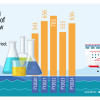Pharma profit falls for first time in five years as costs escalate

Bangladesh's economy has been facing tough times of late as sustained high inflation, hike in interest rates and massive devaluation of the local currency continue to plague the country. In this series, we take a look back at how various industries fared amid the crisis in fiscal year 2022-23. Here is the first part on listed pharmaceuticals.
Profits of listed pharmaceutical companies in Bangladesh shrank in the last fiscal year of 2022-23, the first decline in at least five years, as the cost of production went up.
The taka's significant depreciation against the US dollar and higher raw material, energy and finance costs have pushed up the manufacturing cost.
As per an analysis of The Daily Star, 10 of the 15 listed drug makers registered lower earnings in FY23, reducing the industry's collective profits by 5.16 percent year-on-year to Tk 3,160 crore.
The 10 companies that saw lower profits include industry powerhouses such as Renata Limited, Beximco Pharmaceuticals Ltd and Beacon Pharmaceuticals PLC.
The financial reports of the 15 drug makers show their collective profits grew by 14 percent and 22 percent in FY22 and FY21, respectively. The growth was 15 percent, 21 percent and 10 percent in the three years prior.
"The industry suffered in FY23 as the cost of doing business rose mainly for higher raw material, energy and finance costs," said Muhammad Zahangir Alam, chief financial officer of Square Pharmaceuticals.
He informed that the falling of the value of the local currency is hurting their profits as the exchange rate at the time of opening letters of credit (LCs) on deferred payments ends up being far less than the final value.
For example, importers that opened LCs with an exchange rate of Tk 107 per US dollar in March last year had to pay Tk 108.90 per greenback when making payments three months later.
"In the meantime, the drug makers had to continue selling products at the previous rate. So, their profits fell," Alam said, citing how US dollar availability was a big issue in 2023.
However, the situation has had a comparatively lesser impact on Square Pharmaceuticals as profits of the largest drug company in Bangladesh grew 4.5 percent to Tk 1,898 crore in FY23.
"This was due to our huge product base and the minimum bank loan," Alam added.
Officials of Renata say the overall raw material cost increased by 20 percent to 25 percent year-on-year in the last fiscal year.
Electricity tariffs rose roughly 5 percent three times that year, resulting in a compound increase of around 15.7 percent. Likewise, the price of diesel rose 37 percent and furnace oil 41.4 percent.
Renata saw its profits plunge 47 percent in FY23, the steepest drop among the major drug makers.
Beacon Pharmaceuticals registered the second-sharpest decline with a 45 percent fall while profits of Beximco Pharmaceuticals edged down 9.41 percent.
Jubayer Alam, company secretary of Renata, said the taka's depreciation by more than 21 percent impacted the industry by driving up foreign exchange losses during the imports of raw materials and capital machinery.
Central bank data showed that local drug makers opened LCs worth $762.6 million to import raw materials in the July-April period of FY23, down 23 percent year-on-year. LCs for capital machinery declined 41 percent to $88 million.
The domestic pharmaceutical industry needs to import $1.3 billion worth of raw materials each year as local firms can at best meet 10 to 15 percent of the demand.
Alam said many people are unable to spend as much as they need amid the ongoing inflationary pressure, opting instead for only the most essential drugs.
Also, people have become more hygienic after the Covid-19 pandemic. So, the spread of flu-type diseases has reduced, resulting in slower sales of antibiotics.
"These are impacting the sales growth of drug companies," he added.
The financial reports of the listed pharmaceutical companies showed that their profit growth rate remained below double digits for the past two years despite higher medicine prices.
The industry's overall sales increased 9.9 percent year-on-year to Tk 20,261 crore in FY23 while the growth rate was 8.5 percent, 15.69 percent, 12.1 percent, 41 percent and 11 percent in the years prior.
Drug makers saw exceptionally high sales in 2018-19 when the demand for antibiotics soared for the spread of the flu, Alam said.
"We predicted from the start that drug makers would be hit in FY23, with small companies facing a dire situation," said Mir Ariful Islam, managing director and CEO of Sandhani Asset Management Company.
Sandhani Asset is a fund manager that invests in the stock market.
The pharmaceuticals industry usually remains unaffected in most situations, including economic or political uncertainly, for being a vital sector. Still, small companies struggled in FY23 for the shortage of raw materials and higher raw material prices.
"Hopefully, 2024 will be a better year for drug makers as they are learning to adapt to the US dollar crisis," said Islam, while pointing out that some large companies have stocked up on raw materials.
"Price adjustments for medicines could also be put in place this year."
Local drug makers cater to about 98 percent of the country's demand and also ship products to around 150 foreign markets, including several developed nations.
Pharmaceutical exports witnessed a downward trend recently with shipment having declined 23.7 percent to $175.4 million in FY23, shows data of the Export Promotion Bureau.

 For all latest news, follow The Daily Star's Google News channel.
For all latest news, follow The Daily Star's Google News channel. 







Comments